
Algebra and Logic
metrics 2024
Navigating the Intricacies of Algebra and Logic.
Introduction
Algebra and Logic is a prestigious journal published by Springer, focusing on the intricate fields of algebra, number theory, analysis, and logic. With a history spanning over five decades since its inception in 1968, the journal serves as a critical platform for scholars and practitioners to disseminate cutting-edge research, theoretical advancements, and practical applications within these mathematical domains. Notably, it holds a distinguished Q2 ranking in its categories for 2023, reflecting its impact and relevance in the academic landscape. Though the journal does not currently offer open access options, its rigorous peer-review process ensures the highest standards of scholarly integrity and quality. Additionally, its Scopus rankings further underline its significance, with placements in the competitive percentiles in various subfields. Algebra and Logic is essential reading for anyone involved in mathematical research, providing invaluable insights and fostering dialogue among researchers, professionals, and students alike.
Metrics 2024
 0.62
0.62 0.40
0.40 0.50
0.50 28
28Metrics History
Rank 2024
Scopus
IF (Web Of Science)
JCI (Web Of Science)
Quartile History
Similar Journals
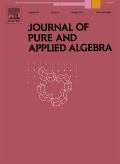
JOURNAL OF PURE AND APPLIED ALGEBRA
Innovating Algebra: Where Theory Meets ApplicationJOURNAL OF PURE AND APPLIED ALGEBRA, published by Elsevier, stands as a premier academic platform in the fields of algebra and number theory, boasting a distinguished impact factor that reflects its rigorous peer-review process and influential research contributions. Established in 1971 and continuing its impressive trajectory until 2025, this journal has carved a niche for itself by providing a forum for innovative studies, theoretical advancements, and practical applications within pure and applied algebra. With its prestigious Q1 ranking in Algebra and Number Theory, the journal not only ranks among the top tier in its category but also offers an extensive collection of research that caters to mathematicians, academicians, and students alike. Scholars will find it an invaluable resource for disseminating their findings, as well as keeping abreast of significant developments in the field, further solidifying its role as a cornerstone of mathematical research.

CUBO-A Mathematical Journal
Fostering Innovation in Mathematical ResearchCUBO-A Mathematical Journal, published by the Department of Mathematics and Statistics at Universidad de La Frontera in Chile, stands as a significant Open Access resource in the field of mathematics since its inception in 2011. With an ISSN of 0716-7776 and an E-ISSN of 0719-0646, this journal invites submissions that explore a wide spectrum of mathematical disciplines, including Algebra, Number Theory, Analysis, Geometry, Topology, and Logic. Although currently positioned in the Q4 category across various mathematical domains and registered at Rank #223/399 in General Mathematics in Scopus, CUBO serves as a valuable platform for emerging researchers and practitioners to disseminate their findings. Operating under a continuous commitment to accessibility, CUBO fosters an inclusive academic environment that supports the exchange of innovative ideas vital to advancing mathematics. The journal's target audience encompasses a diverse community of researchers, professionals, and students eager to participate in the expanding dialogue within mathematical sciences.

International Electronic Journal of Algebra
Empowering Research: A Premier Platform for Algebraic ExplorationThe International Electronic Journal of Algebra (IEJA) is a premier open-access platform dedicated to advancing research in the field of algebra and number theory. Established in Turkey and published by IEJA-INT ELECTRONIC JOURNAL ALGEBRA, this journal has been providing unrestricted access to high-quality scholarly articles since 2007, facilitating the dissemination of valuable findings and innovative methodologies to a global audience. With an ISSN of 1306-6048 and a notable Scopus rank of 85 out of 119 in its category, IEJA contributes significantly to the mathematical community, evidenced by its Q3 quartile ranking in Algebra and Number Theory as of 2023. Researchers, professionals, and students can engage with a diverse range of topics in algebra, enhancing both theoretical understanding and practical applications in this vital area of mathematics. As a journal committed to fostering collaboration and progress, IEJA stands out as an essential resource for anyone seeking to contribute to and learn from the evolving discourse in algebra.

SIAM Journal on Applied Algebra and Geometry
Elevating Understanding through Rigorous Mathematical InquirySIAM Journal on Applied Algebra and Geometry, published by SIAM Publications, is a premier academic journal that occupies a vital space in the fields of Algebra, Geometry, and Applied Mathematics. With an impressive impact factor reflected in its Q1 category rankings in 2023 across key mathematical disciplines such as Algebra and Number Theory, as well as Geometry and Topology, this journal is positioned among the highest echelons of mathematical research. Since its inception in 2017, it has become a crucial source for advanced studies and applied techniques that harness algebraic and geometric methods, catering to both theoretical insights and practical applications. Researchers, professionals, and students alike benefit from its rigorous peer-reviewed articles that explore contemporary challenges and developments in mathematics. While Open Access options are currently not available, the journal remains dedicated to fostering innovation and knowledge dissemination within the scientific community, thus ensuring significant contributions to the advancement of the mathematical sciences.
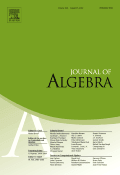
JOURNAL OF ALGEBRA
Illuminating the Path of Algebraic InnovationThe JOURNAL OF ALGEBRA, published by Academic Press Inc. Elsevier Science, is a premier scholarly outlet dedicated to the field of algebra and number theory. With its impressive Q1 ranking in the 2023 category of Algebra and Number Theory and a solid Scopus rank of #46 out of 119, it stands as a crucial resource for researchers and professionals seeking to deepen their understanding of advanced algebraic concepts. Operating since 1964 and continuing through 2025, the journal boasts a rich history of publishing influential research that drives the discipline forward. While the journal does not currently offer open access options, it remains committed to providing high-quality peer-reviewed content to the academic community. Its comprehensive archive and cutting-edge research articles serve as essential tools for students, researchers, and practitioners aiming to stay at the forefront of algebraic studies.
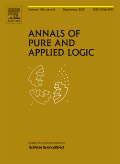
ANNALS OF PURE AND APPLIED LOGIC
Pioneering Insights in Mathematical LogicANNALS OF PURE AND APPLIED LOGIC is a premier academic journal published by Elsevier, specializing in the foundational aspects of logic since its inception in 1974. With a strong commitment to disseminating original research, the journal focuses on both pure and applied logic, making significant contributions to the fields of mathematics and computer science. The journal is recognized for its rigorous peer-review process and is currently ranked Q1 in Logic, reflecting its status among the top-tier publications in the discipline. Researchers will find valuable insights and advancements in logical theory and practice in its pages, while the journal's Scopus ranking further positions it strategically within the mathematical logic community. Although it is not an open-access publication, it offers convenient access options for institutions and subscribers, ensuring a wide reach for groundbreaking findings. The ANNALS OF PURE AND APPLIED LOGIC continues to be an essential resource for professionals, students, and academics alike, facilitating a deeper understanding of logical frameworks and their applications.

Forum of Mathematics Sigma
Connecting scholars through open access to cutting-edge research.Forum of Mathematics Sigma is a premier open access journal published by Cambridge University Press that has been at the forefront of mathematical research since its inception in 2013. With a strong emphasis on advancing the fields of mathematics, the journal consistently achieves Q1 rankings across multiple categories, including Algebra and Number Theory, Analysis, and Computational Mathematics. This distinction highlights its impact and relevance within the scholarly community. The journal prides itself on providing a platform for innovative research, fostering collaboration among researchers and practitioners across various mathematical disciplines. Open access publication ensures that cutting-edge findings are widely available to readers globally, enhancing the dissemination of knowledge. With an address in the heart of Cambridge, England, Forum of Mathematics Sigma is dedicated to promoting high-quality research and making significant contributions to the development of mathematics.
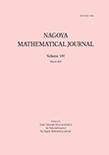
NAGOYA MATHEMATICAL JOURNAL
Pioneering Research for a Global Mathematical CommunityNAGOA MATHEMATICAL JOURNAL, published by Cambridge University Press, is a prestigious journal that has been at the forefront of advancing mathematical scholarship since its inception in 1950. With an ISSN of 0027-7630 and an E-ISSN of 2152-6842, this journal has gained recognition for its high-quality research contributions in the field of mathematics, achieving a Q1 classification in Mathematics (miscellaneous) as of 2023. The journal’s impact is further reflected in its Scopus rank of #164 out of 399 in the General Mathematics category, positioning it within the 59th percentile of its peers. Scholars, researchers, and students can access a range of innovative mathematical studies that explore diverse topics, fostering a vibrant dialogue within the mathematical community. By catering to a global audience, the NAGOYA MATHEMATICAL JOURNAL continues to play a critical role in shaping contemporary mathematical discourse and research.

Cambridge Journal of Mathematics
Unveiling the Depths of Mathematical KnowledgeCambridge Journal of Mathematics, published by INT PRESS BOSTON, INC, is a premier platform for the dissemination of cutting-edge research in the field of mathematics. With an ISSN of 2168-0930 and E-ISSN 2168-0949, this journal stands out in a competitive academic landscape, currently ranked #58 out of 399 in General Mathematics, placing it in the top 15% within its category according to Scopus metrics. The journal serves as a vital resource for researchers, professionals, and students alike, aiming to foster groundbreaking mathematical inquiries and foster collaboration across disciplines. Published from 2020 to 2024, the Cambridge Journal of Mathematics is committed to maintaining high standards of scholarship, making it an essential read for those who are passionate about advancing mathematical knowledge and its applications.
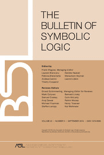
BULLETIN OF SYMBOLIC LOGIC
Fostering Intellectual Discourse in Symbolic LogicBULLETIN OF SYMBOLIC LOGIC, published by Cambridge University Press, is a distinguished academic journal that serves as an essential platform for the dissemination of research in the realms of logic and philosophy. Since its inception in 1995, this journal has progressed through its convergence years and remains committed to fostering intellectual discourse among scholars. With a 2023 ranking in the Q1 category of Philosophy and a Q3 classification in Logic, it continues to uphold its reputation as a significant contributor to the field. While operating under a traditional subscription model, the journal dedicates itself to publishing high-quality articles that explore foundational issues, advanced theories, and innovative insights in symbolic logic. Researchers, professionals, and students will find invaluable resources within its pages, particularly as it ranks favorably among peers, with noteworthy standings in Scopus rankings. For those seeking to deepen their understanding of logical frameworks and their philosophical implications, BULLETIN OF SYMBOLIC LOGIC is an indispensable resource.